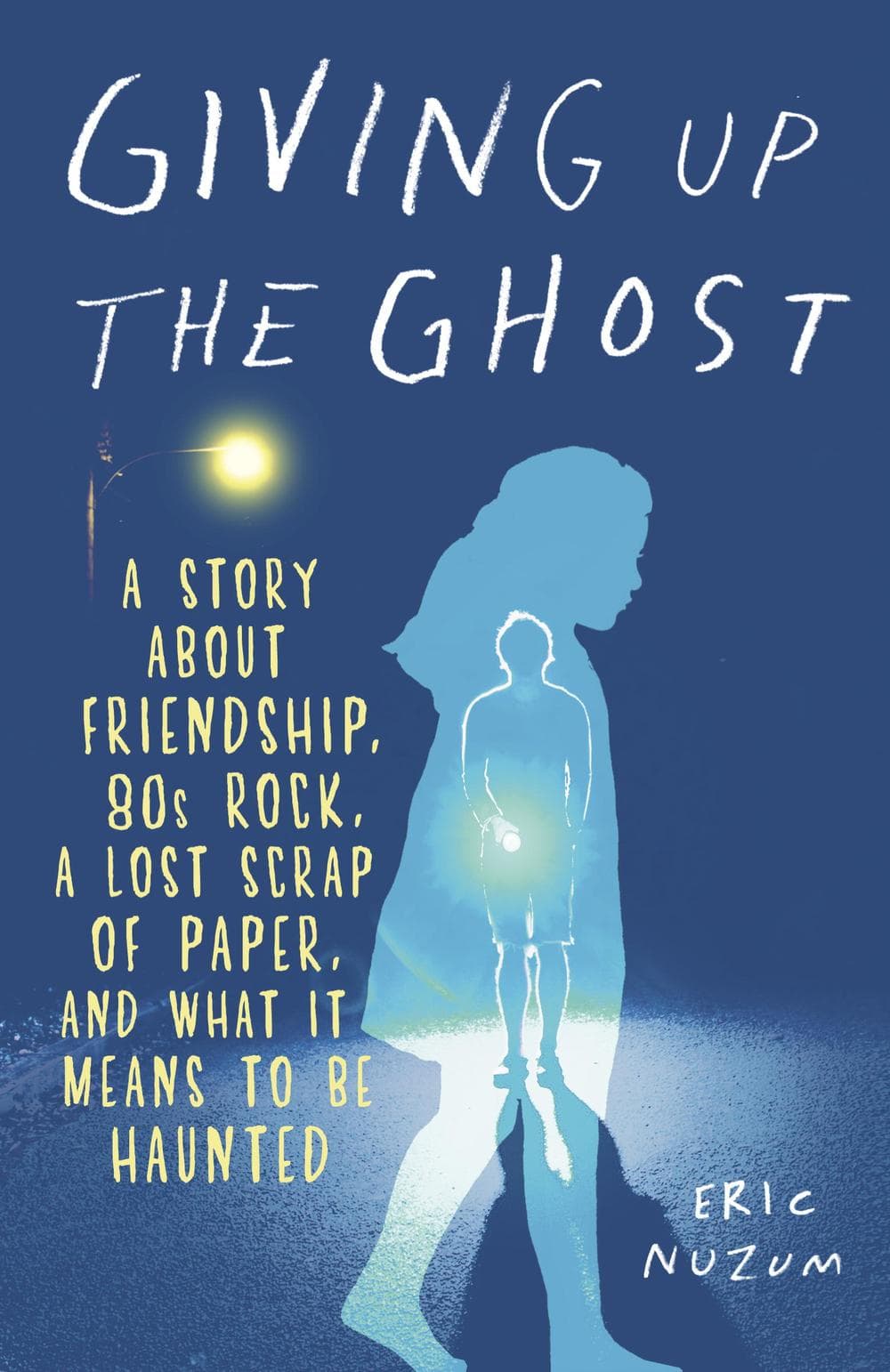Advertisement
NPR Exec Eric Nuzum On 'Giving Up The Ghost'
Resume
For much of his early life growing up in Canton, Ohio, Eric Nuzum believed that he was haunted.
He had recurring dreams of a little girl in a blue dress that terrified him, and he became convinced that she was in the attic of his parents' home.
His life became centered around first avoiding her and then when he was in his teens, taking drugs partly motivated by the fact that they might help her manifest.
As Nuzum tells Here & Now's Robin Young: "If there was really a ghost there, I wanted to see her. I wanted to find out why I was going through all this terror, what was the point?"
In his new memoir 'Giving Up The Ghost: A Story about Friendship, 80s Rock, A Lost Scrap of Paper and What It Means To Be Haunted,' Eric talks about his teenage years as a high school oddball, the friendship that helped pull him out of a hospital mental ward to the ghost tours he took as an adult - armed with ghost-detecting meters - looking for other ghosts in order to exorcise his own.
Today, Nuzum is vice president for programming at NPR.
Interview Highlights
How did the little girl in blue feel to you as a kid?
"It is equally both a horrifying story for me to recall and the most normal thing in the world. Because the thing that I don’t think people understand about this is that this was normal to me growing up, that there was this presence of this ghost in my life. The only things that I ever really saw was really nothing. I felt things. I heard some noises which I decided to attribute to being a ghost I saw in my dreams. And, I kind of tailored my entire life around dealing with this.
"I moved up into the attic, which is something I’m still not quite sure why I decided that was a good idea, but I felt like I could be closer to her, maybe I could kind of get this over with, whatever it’s about. And I would schedule my life around making sure I wasn't near that door that she was behind, or I thought she was behind. I would sometimes spend hours staring at the door, working up the courage to just run up to it, throw it open, and see if something was on the other side that I could see before it disappeared. But then I also thought that this was a normal teen life."
On the death of Laura, his best childhood friend
"I spent probably more time with her at that period of my life than any other person, including my own family, and I realized how I walked away from that relationship with many more questions than I did answers. And, to me, the whole thing is connected - whether there are ghosts, and whether or not there really was a girl in the blue dress, or really whether there was something in the attic or in whether there’s something in Gettysburg, and Laura. They’re all interconnected to me, and I didn't realize it at first.
"When I started working on this story, it was supposed to be kind of a romp of, like, this guy going to all these scary places and he’s scared, and lets watch him squirm and watch him hang around with odd people. As I started to sit down and write the book, I started including all these little tidbits about why I was scared of ghosts and it became very clear to me that, as I was opening myself up to the possibility of interacting with a ghost in Gettysburg or Lilydale, that I was really opening myself up to remembering a history that I had pretty much stomped on and suppressed for the last two decades of my life, including my relationship with Laura. I spoke to her family when I wrote this book for the first time in 20 years."
Does the little girl in blue come visit you anymore?
"No, she hasn’t. Since Laura died I’ve never had another dream. In the book, I go back to my parents’ old house, which is owned by another family now, and I walked through that house and I did not know what I was getting into. I didn’t know what was going to happen when I opened that attic door. And I remember just opening that attic door and just sighing, and wondering what terrorized me so much about that place. I’ve come to the realization in all this that I don’t think places are haunted, I think people are haunted."
Book Excerpt: 'Giving Up The Ghost'
By: Eric Nuzum

There are many ghost stories. Here’s one:
One night in June, 1984, I took a girl from my high school named Laura Patterson to meet my friend Jimmy at a local miniature golf course, the Putt-O-Links.
Putt-O-Links was located at the end of a long strip of abandoned industrial buildings outside of Canton, Ohio. Canton was once a blue collar Mecca devoted to making vacuum cleaners, ball bearings, and steel. During the 1980s, Canton—like the entire Midwest Rust Belt—was in absolute denial that its way of life was dying right before its eyes. I don’t even think globalization was a word then, but places like Canton were already experiencing it firsthand.
Each spring the world around Putt-O-Links got smaller and smaller. One by one the nearby factories closed. Shortly after, the car dealerships down the street moved. The following year the diner closed. Eventually, the Putt-O-Links and the ice cream stand next door were the only signs of life for half a mile in any direction. Then, that spring, the Putt-O-Links didn’t open either. Neither had the ice cream stand. There were no “going out of business” or “thanks for 30 great years” signs, just tall weeds and a fallen rusty chain that had once closed off the parking lot. It almost looked as if the owners had just forgotten it was summertime and time to open again.
My friend Jimmy didn’t let Putt-O-Links’s change of fortune slow him down; he still went golfing there at least three times every week just like he had every summer. Every time I was with him, highlights of his mini-golf exploits were always part of the conversation. He shared his secrets for getting his little pink ball exactly up the middle of the big clowns tongue and how the now stationary windmill blades always screwed up his hitting par on the 12th hole. So when I told him I wanted us to hang out with Laura, a girl I’d only recently started spending time with. He immediately suggested meeting up at Putt-O-Links.
Jimmy had been designated as the drummer in my budding quasi-fictional rock band, Ritzo Forte, a group that largely existed in order to impress girls with the claim that I was in a rock band. I’d seen Jimmy sit behind his drum kit and play for about three and a half seconds one time when we were doing bong hits in his basement. That was good enough for me. I was to be Ritzo Forte’s singer, songwriter, and principle stylist. I owned a Radio Shack microphone and a mic stand on which to put said microphone. Ritzo Forte had a name, a list of influences, even some song lyrics and titles. The only things missing were band mates, equipment, complete songs, rehearsals, and actual performances.
However, I had put a great deal of thought into this band and its potential awesomeness. It was just a matter of time until everything fell into place. I was trying to impress Laura with my seriousness and determination, so I thought it would be good for us to go out with Jimmy.
It was almost dark by the time we got to Putt-O-Links. Introductions weren’t necessary. They weren’t that kind of people. Laura knew who Jimmy was; he knew her. Jimmy had been pre-briefed for the occasion. I reminded him of all the cool bands he was supposed to like, drilled him on the titles and lyrics to the songs we hadn’t written yet, and confirmed our plan to buy matching knee-length leather coats for all Ritzo Forte members.
Jimmy and I had gone to school together for six years, but were never really tight until our senior year, when it became increasingly apparent that we were both going to be “Left Behinds.” Left Behinds were those kids who didn’t put in a lot of time visiting campuses or filling out admission applications. It just seemed like a waste of time. It was obvious that we weren’t going anywhere. Jimmy and I bonded because we both knew that when all our other friends left for school that fall, we’d be pretty much all we had left.
Excerpted from the Book GIVING UP THE GHOST by Eric Nuzum. Copyright © 2012 by Eric Nuzum. Reprinted with permission of Dial Press, an imprint of The Random House Publishing Group, a division of Random House, Inc.
Guest:
- Eric Nuzum, author of 'Giving Up The Ghost.' He tweets at @ericnuzum.
This segment aired on October 22, 2012.